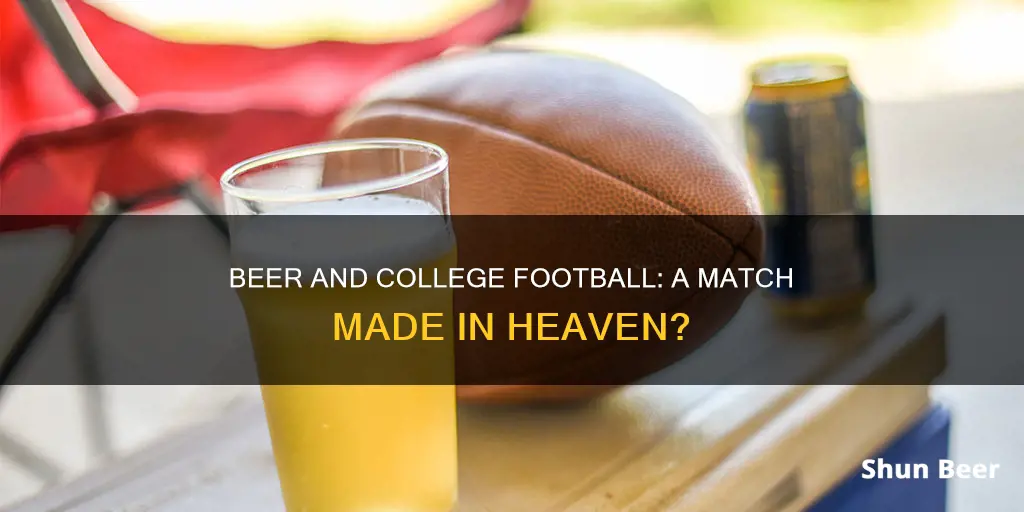
Beer and other alcoholic beverages are now commonly available at college football games in the United States. While it was previously rare to find alcohol for sale at college football stadiums, in recent years, the NCAA and conferences have relaxed their rules, allowing universities to sell alcohol and boost revenue. As a result, the number of schools selling alcohol has increased significantly, with 88% of FBS schools selling alcohol in 2023. However, policies vary among universities and conferences, with some schools only allowing alcohol sales in premium seating areas or implementing strict limits on the number of drinks purchased.
What You'll Learn

Beer at college football games is becoming the norm
This shift can be attributed to the NCAA and conferences relaxing their rules around alcohol sales, as well as the desire of universities to increase revenue and attract more fans to the games. As one health behavior social scientist at Texas A&M University noted, the decision of the Southeastern Conference to allow schools to sell alcohol in 2019 led to an "exponential rise" in alcohol sales at college football games across the country.
While the sale of beer at college football games is becoming more common, there are still some schools that do not allow it. For example, the University of Michigan did not sell alcohol at its football games in 2023, although it did start selling alcohol at basketball and hockey games. Similarly, the University of Wisconsin did not sell alcohol to the general public at football games in 2023, but it was considering doing so if fan experience metrics increased.
The sale of alcohol at college football games has sparked some debate. On the one hand, it can be seen as a way to boost revenue and create a more exciting atmosphere for fans. On the other hand, there may be concerns about excessive drinking and its potential impact on the health and safety of students and other attendees. Some universities have implemented measures to mitigate these risks, such as limiting the number of drinks per transaction and providing designated driver programs.
Overall, the sale of beer at college football games is becoming increasingly common, and it will be interesting to see how this trend continues to develop in the future.
Beer and Breastfeeding: What's Safe?
You may want to see also

Beer sales boost revenue and attract fans
Beer sales at college football games have become an increasingly common feature of the fan experience in recent years. The sale of alcohol has been touted as a way to "bring in more revenue and attract fans" to stadiums. Once a rarity, the sale of beer and wine inside college football stadiums has now become the norm, with 80% of Power Five conference schools and Notre Dame selling alcohol in public areas of their stadiums on game days.
The University of North Carolina, for example, has seen alcohol "help the bottom line" with about $4 million in sales. After having $320,213 in net sales during the 2019-20 athletic year, the school quadrupled that number the following year. West Virginia University has seen similar success, receiving more than $3 million in revenue from alcohol sales since 2011.
The decision to sell alcohol at college football games is often driven by economic factors, as athletic departments seek to boost revenue and compete with other fan experiences. As Jack Miner, director of operations at Ohio State’s registrar office, noted, “Being in Columbus, Ohio, we’re not competing against professional sports teams, but locations where someone can go watch a game. Very frequently we were losing attendance to people staying at home or watching from a bar.”
In addition to increasing revenue, the sale of beer at college football games can also help improve the fan experience and boost attendance. University officials have anecdotally reported seeing more fans attending games and staying in the stands longer. The availability of alcohol may also help to reduce incidents of rowdy fan behavior related to binge drinking, as fans no longer feel the pressure to "preload" before entering the stadium.
However, the decision to sell alcohol at college football games is not without controversy. Some schools have expressed concern about the potential impact on student behavior and the appearance of profiting off alcohol. There are also worries about binge drinking, disorderly behavior, and violence that can come with consuming alcohol. Despite these concerns, the sale of beer and wine at college football games continues to grow, with more schools opting to include it as part of their fan experience.
Crafting Beer: My Career in Brewing
You may want to see also

Most colleges allow beer sales, but rules vary
Beer and other alcoholic beverages are now available at most college football games across the US. However, the rules around the sale of alcohol vary from state to state and college to college.
In recent years, the NCAA and conferences have loosened rules, allowing universities to sell alcohol. In 2018, 52 out of 129 Football Bowl Subdivision programs had stadium-wide alcohol sales. In 2023, of the 133 FBS schools, 117 (88%) were selling alcohol, with three schools—Kentucky, Michigan State, and Western Michigan—selling alcohol for the first time. This marks a significant increase in alcohol sales at college football games, with the biggest jump occurring in 2019, when 56 FBS schools started selling alcohol stadium-wide.
While some states, like Utah, have strict liquor laws that prohibit alcohol sales at college football games, others have left the decision up to the individual schools. For example, the University of Michigan does not allow alcohol sales at its football games, while Michigan State University does. Similarly, Clemson's stadium does not sell alcohol, but fans with premium tickets can bring their own drinks to private seating areas.
Alcohol sales have become a way for schools to increase revenue and attract fans to their venues. However, there are still some colleges that are hesitant to allow alcohol sales, with concerns about the impact on the collegiate atmosphere and fan experience.
Overall, while the majority of colleges now allow beer sales at football games, the rules and regulations surrounding these sales vary depending on the state and the individual school's policies.
Beer Drop: How Does the Subscription Work?
You may want to see also

Beer sales are restricted based on seating
Beer sales at college football games are subject to varying restrictions, including seating arrangements. While the availability of beer at college football games has increased in recent years, with 88% of FBS schools selling alcohol in 2023, not all colleges permit beer sales, and those that do may have specific restrictions in place.
Historically, alcohol sales at college football games were largely restricted to premium seating areas or suites, excluding fans with regular tickets from purchasing beer. This trend is changing, with more colleges opting to sell alcohol stadium-wide. However, some colleges continue to limit beer sales to specific seating sections.
For example, Georgia's Sanford Stadium sells alcohol in premium seating locations but not to general attendees. Similarly, some colleges offer alcohol only in luxury suites or club suites, such as Virginia Tech and Ohio State. These restrictions ensure that beer sales are confined to certain areas of the stadium, often targeting premium or suite seating.
The decision to restrict beer sales based on seating is influenced by various factors, including the desire to increase revenue, enhance fan experience, and comply with state regulations. By offering alcohol in specific seating sections, colleges can generate additional income from alcohol sales while potentially attracting fans who enjoy drinking beer during games.
However, colleges must also consider the challenges associated with alcohol consumption, including the presence of underage students and the potential for alcohol-related incidents. Restricting beer sales to certain seating areas can help manage these concerns, providing a controlled environment for alcohol consumption within the stadium.
While beer sales are becoming more prevalent at college football games, seating restrictions remain in place at some colleges, reflecting a balanced approach to managing alcohol sales and ensuring a safe and enjoyable experience for all attendees.
Beer and Aleve: A Safe Mix?
You may want to see also

Beer sales are banned in some states/colleges
In 2021, the state of Utah banned alcohol sales at college football stadiums, as the state has some of the strictest liquor laws in the country. The same year, a large Midwestern university, the University of Iowa, began selling alcohol to spectators for the first time, and a study was conducted to determine the impact of alcohol sales on alcohol-related emergency department (ED) visits and emergency medical services (EMS) calls. The study found no significant increase in alcohol-related emergencies, and the university benefited financially from the sales.
Historically, college football venues have avoided alcohol sales due to concerns about promoting alcohol abuse and the legal drinking age. However, with the sport's growing popularity, there is pressure to allow beer sales, and some colleges have started to do so, seeing it as a lucrative revenue stream.
The Magic Behind Beer Ripples: How Does It Work?
You may want to see also
Frequently asked questions
It depends on the college. While some colleges allow beer and other alcoholic drinks to be sold at football games, others do not.
Beer is sold at the designated concessions in some colleges, with a two-drink maximum per identification, per transaction. Some colleges also have strict tailgating instructions that limit where, when, and how alcohol can be served.
As of 2023, 117 out of 133 FBS schools (88%) sell alcohol during college football games. Some examples include Florida International, Southern Mississippi, Boston College, Clemson, Florida State University, Georgia Tech, and Wake Forest University.
As of 2023, 16 schools do not sell alcohol during college football games. Some examples include the University of Michigan, the University of Wisconsin, Georgia, North Carolina State University, and the University of Southern California.







